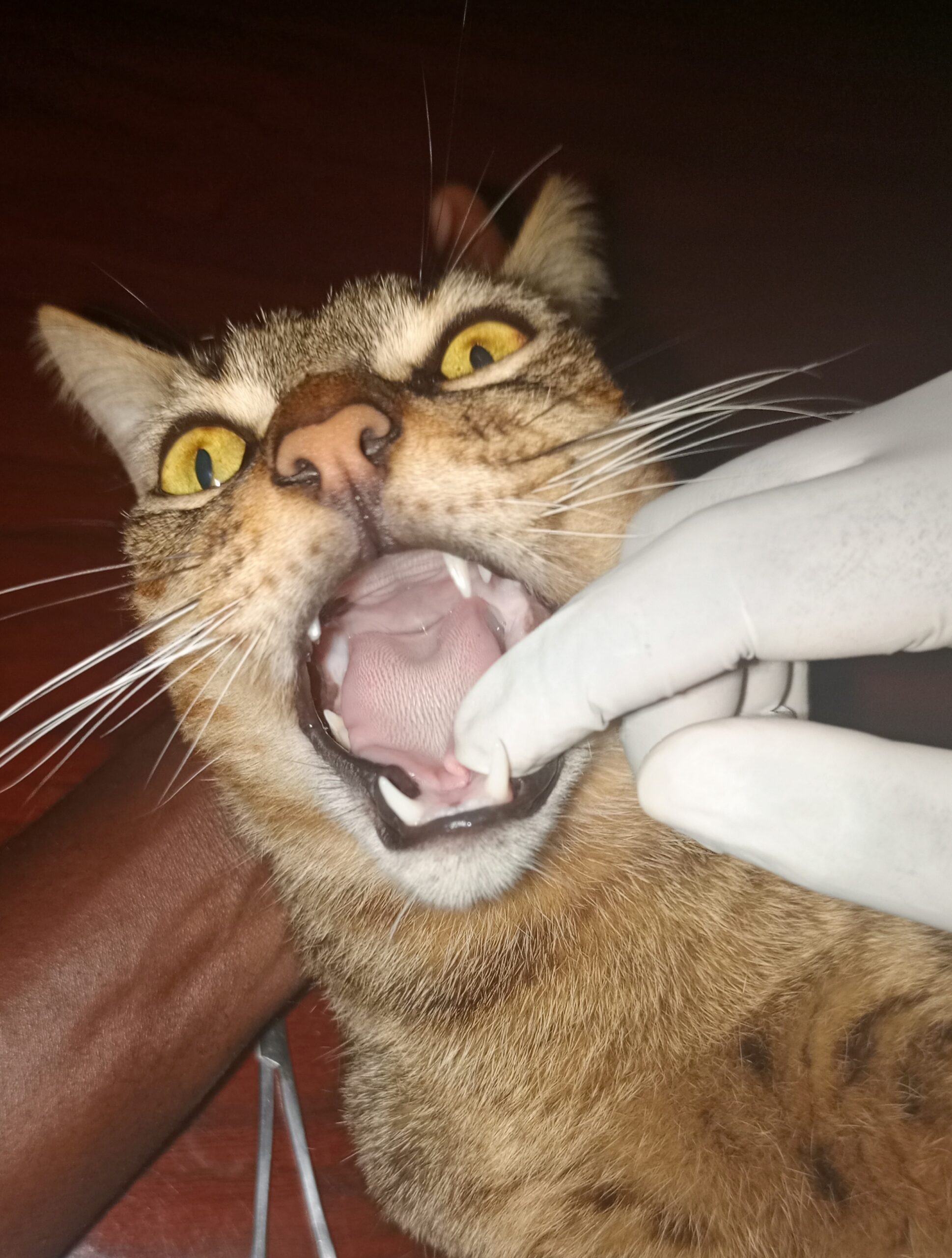
One evening in Muyenga, Sarah noticed her cat, Simba, cuddling next to her on the couch. As Simba yawned, she was hit with a strong, foul smell coming from his mouth. At first, she thought maybe it was just the food he had eaten, but the odor got worse over the next few days. Simba stopped eating his favorite meals, drooled a little, and even seemed uncomfortable when chewing.
Worried, Sarah searched online for “cat bad breath treatment in Kampala” and “best cat doctor near me.” Like many other pet owners in Ntinda, Old Kampala, Makindye, Munyonyo, Bugolobi, Nsambya, and beyond, she wanted answers quickly. That’s when she found Superior Animal Clinic, located in Makindye along Salaama Road.
When she brought Simba in, our veterinary team discovered that the bad breath was caused by severe dental disease. After a professional dental cleaning, antibiotics, and some follow-up care, Simba’s breath was fresh again—and he was back to eating happily and playing around the house.
Stories like Simba’s are very common in Kampala. Bad breath in cats is not just a minor issue—it’s usually a sign of an underlying health problem that needs professional care. At Superior Animal Clinic, we’ve helped countless cat owners across Ntinda, Katwe, Kasubi, Nakasero, Zana, Lubowa, Seguku, Buziga, and all surrounding areas understand the causes of bad breath and find lasting solutions.
Why Do Cats Get Bad Breath?
Cat owners in Kampala often ask us at Superior Animal Clinic: “Why does my cat’s mouth smell bad?” The truth is, bad breath (halitosis) in cats is not just about poor hygiene—it’s usually a sign that something more serious is going on inside your cat’s mouth or body. Below are the most common reasons cats in Uganda develop bad breath:
1. Dental and Gum Disease (Most Common Cause)
- Tartar and plaque buildup: Just like humans, cats get plaque and tartar that trap bacteria, producing a foul odor.
- Gingivitis: Inflammation of the gums leads to pain, swelling, and bad breath.
- Periodontal disease: Untreated gum disease can cause infections that smell very bad.
- Tooth abscesses or broken teeth: Infected teeth release pus, leading to very strong mouth odors.
👉 In Kampala, many cats are fed mainly on fish, bones, and leftovers. These diets easily stick to teeth, increasing the risk of gum disease.
2. Kidney Disease
Cats with kidney problems often develop a strong ammonia-like smell in their mouth, similar to urine. This happens because toxins that should be removed by the kidneys build up in the blood and affect the cat’s breath.
3. Diabetes
If your cat’s breath smells sweet or fruity, it could be a warning sign of diabetes. This condition is becoming more common in cats we treat in Muyenga, Munyonyo, and Ntinda, especially among overweight or older cats.
4. Stomach and Liver Problems
Sometimes, the odor comes from deeper inside the body:
- Stomach disorders can cause vomit-like breath.
- Liver disease can lead to a foul, rotten smell often accompanied by yellow gums and loss of appetite.
5. Oral Tumors and Mouth Ulcers
Older cats, especially those that have never had regular vet check-ups, may develop oral tumors or ulcers that produce a metallic or decaying odor.
6. Diet and Feeding Habits
In many Kampala households, cats scavenge for food or eat spoiled leftovers, fish spines, or raw meat. These can rot between the teeth, cause infections, and leave a persistent smell.
7. Infections from Foreign Objects
Sometimes, cats get bones or small objects stuck in their mouth. These injuries become infected, producing a strong odor. This is something we frequently treat at Superior Animal Clinic in Makindye.
8. Respiratory Infections
Upper respiratory tract infections, which are common in cats that roam outdoors in places like Kasubi, Katwe, and Nsambya, can cause mucus buildup and mouth odor. The infection makes the cat’s saliva smell bad.
9. Parasites (Worm Infestations)
Severe worm infestations, especially roundworms and hookworms, can affect the digestive system and cause foul-smelling breath. Many cats in Makindye, Buziga, and rural Mityana are prone to this due to irregular deworming.
10. Poor Oral Hygiene (Never Having Teeth Brushed)
Unlike dogs, most cat owners in Kampala don’t brush their cat’s teeth. Over time, this neglect causes bacteria, tartar buildup, and smelly infections.
11. Fungal Infections (Oral Thrush)
Some cats develop fungal infections in the mouth, especially those with weak immune systems. This produces a sour, yeasty odor.
12. Diets High in Fish or Spoiled Food
Feeding your cat leftover tilapia, Nile perch bones, or market scraps can leave residues in the mouth, rot between the teeth, and cause terrible breath.
13. Trauma or Injuries in the Mouth
Cats that fight (common in areas like Mutundwe, Rubaga, and Nakawa) may suffer bites or wounds inside the mouth. These wounds can get infected, leading to pus and bad odors.
14. Foreign Body in the Mouth or Nose
Sometimes, a fish bone, stick, or grass blade can get stuck in a cat’s gums or nasal cavity. This foreign body rots over time, releasing a very bad smell.
15. Cancer and Oral Tumors
Oral cancers produce a rotten or metallic odor due to tissue death. This is more common in older cats in Kampala and is a serious condition requiring early diagnosis.
16. Systemic Illnesses
Any disease that weakens your cat’s immune system (like Feline Immunodeficiency Virus – FIV, or Feline Leukemia Virus – FeLV) can cause secondary oral infections, leading to bad breath.
✅ In summary:
If your cat has persistent bad breath, it’s not “just a cat thing.” It could be a dental disease, organ problem, infection, or dietary issue. The best step is to bring your cat to Superior Animal Clinic for a full check-up, where we can quickly find the cause and give the right treatment.
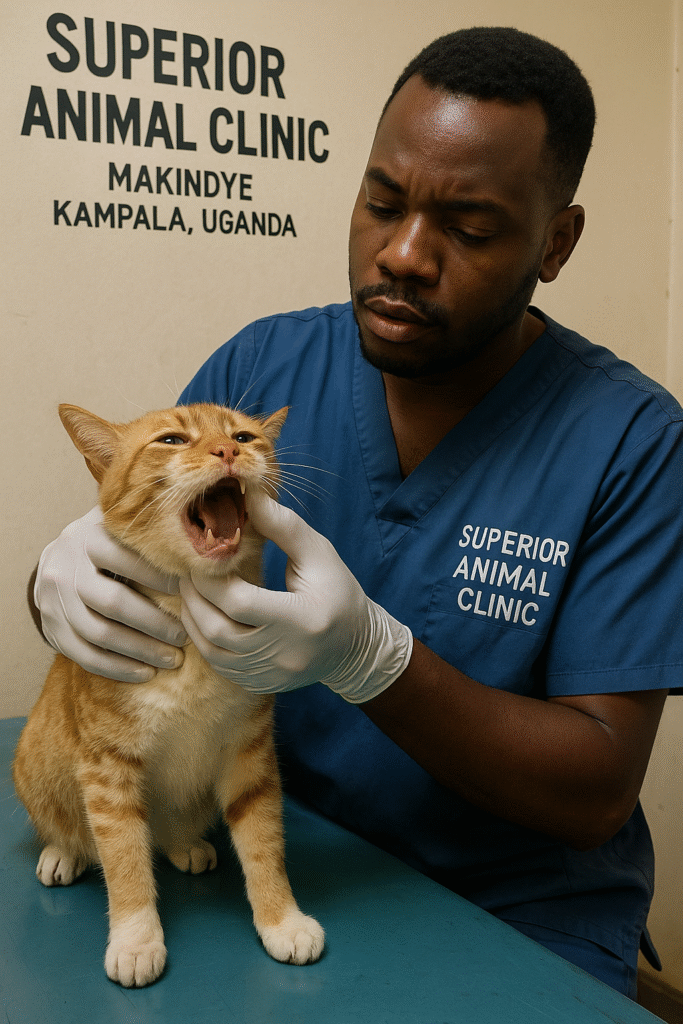
Which Cats Are More Prone to Bad Breath?
Not all cats develop bad breath at the same rate. At Superior Animal Clinic in Makindye, Kampala, we’ve noticed that certain cats are more at risk due to their age, breed, diet, and lifestyle habits.
1. Older Cats (Senior Cats)
As cats age, dental problems become more common. Senior cats often develop gingivitis, tooth decay, and gum infections, which are the leading causes of bad breath. At Superior Animal Clinic, many of the cats we see from Muyenga, Bugolobi, and Kololo are older pets struggling with dental disease.
2. Certain Cat Breeds
Some breeds are naturally more prone to dental and gum issues due to their jaw structure:
- Persian Cats & Exotic Shorthairs – Their short, flat faces make it harder for teeth to align properly, leading to food buildup.
- Siamese & Oriental Breeds – They are genetically predisposed to gum inflammation.
These breeds are very popular among cat lovers in Ntinda, Nakasero, and Naguru, and we treat them frequently for bad breath.
3. Cats Fed Mostly on Fish and Leftovers
In Kampala, many cats are fed mainly on raw fish, tilapia bones, chicken scraps, and leftovers. This diet increases tartar buildup and infections. Cats in areas like Kasubi, Katwe, and Nsambya—where scavenging is common—are more prone to mouth odor because they eat whatever they can find.
4. Outdoor and Free-Roaming Cats
Cats that roam freely in neighborhoods like Makindye, Mutundwe, and Nakawa often scavenge garbage, fight other cats, or pick up infections from wounds in the mouth. These cats are much more likely to suffer from chronic bad breath than strictly indoor cats.
5. Overweight and Diabetic Cats
Obese cats, which are becoming more common in wealthier areas like Muyenga, Buziga, and Munyonyo, are at higher risk of diabetes. One of the signs of diabetes is a sweet, fruity-smelling breath.
6. Cats with Underlying Health Issues
Cats with kidney disease, liver problems, or oral tumors are far more likely to have persistent bad breath. These conditions are common in older cats across Kampala and require urgent veterinary attention.
✅ Key Takeaway for Cat Owners:
Your cat’s age, breed, diet, and lifestyle all play a big role in whether they develop bad breath. If your cat is older, free-roaming, or eating mostly scraps, you should schedule regular dental check-ups at Superior Animal Clinic, Makindye, to catch problems early before they become severe.
Symptoms Cat Owners Should Look Out For
- Persistent foul smell from the mouth
- Drooling or pawing at the mouth
- Refusal to eat or difficulty chewing
- Weight loss and weakness
- Swollen gums or visible tartar
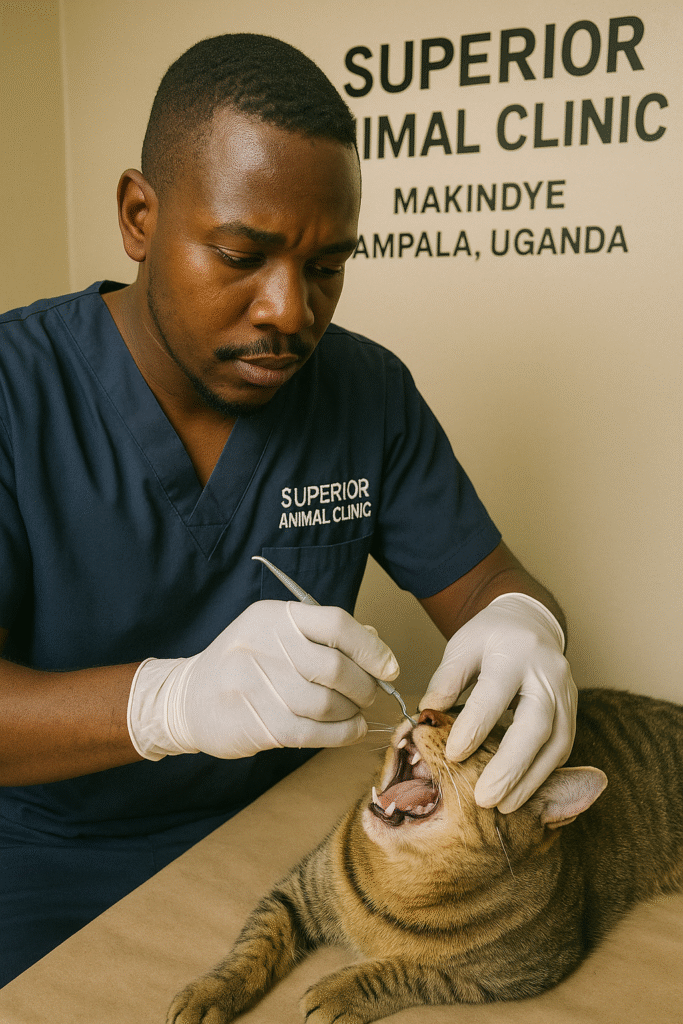
Treatment of Cat Bad Breath at Superior Animal Clinic
At Superior Animal Clinic in Makindye, we understand how concerning bad breath in your cat can be. That’s why we follow a structured, thorough treatment process to ensure your cat’s breath, teeth, and overall health are fully restored. Here’s what to expect:
Step 1: Initial Examination
- Our experienced veterinarians begin with a full physical examination of your cat.
- We check the mouth, teeth, gums, tongue, and throat, as well as overall body condition.
- During this step, we also ask about your cat’s diet, behavior, and any symptoms you may have noticed, like drooling, difficulty eating, or weight loss.
Tip for Kampala cat owners: Being honest about your cat’s outdoor habits, diet (leftovers or scavenging), and age helps us identify risk factors quickly.
Step 2: Diagnostic Tests
Depending on the examination findings, we may perform:
- Oral X-rays – Detect hidden dental problems, tooth root infections, or bone issues.
- Blood tests – Check for kidney disease, diabetes, or liver problems that can cause bad breath.
- Urinalysis – Helps evaluate kidney function and detect infections.
- Dental probing – Measures gum depth and identifies periodontal disease.
This thorough diagnostics phase ensures that we treat the root cause, not just the symptom of bad breath.
Step 3: Treatment
At Superior Animal Clinic, treatment is customized based on the cause of your cat’s bad breath:
A. Dental Cleaning
- We perform ultrasonic scaling and polishing under safe anesthesia.
- This removes plaque, tartar, and bacteria that cause mouth odor.
B. Tooth Extraction (if necessary)
- Severely infected or damaged teeth are removed to prevent recurring infection.
C. Medications
- Antibiotics (Amoxicillin, Clindamycin) for bacterial infections.
- Pain relief (Meloxicam, Buprenorphine) to ensure comfort.
- Anti-inflammatories or mouth gels to reduce gum inflammation.
D. Treatment for Underlying Illnesses
- If bad breath is linked to kidney disease, diabetes, or liver problems, we manage these conditions with medication, dietary changes, and ongoing monitoring.
Step 4: Follow-Up Care
- After treatment, we schedule follow-up visits to check healing, monitor oral health, and prevent recurrence.
- Our vets in Makindye guide you on how to maintain clean teeth at home, including brushing techniques and safe dental products.
- We also provide guidance on monitoring your cat’s behavior, appetite, and overall health.
Step 5: Diet and Home Care
Proper diet and home care are essential to prevent bad breath from returning:
- Feed dental prescription diets (Hill’s t/d or Royal Canin Dental Care).
- Avoid raw fish, bones, and leftover table scraps.
- Provide fresh water at all times.
- Use dental chews, gels, or brushing to maintain oral hygiene.
- Maintain regular vet check-ups every 6 months, especially for older or high-risk cats.
✅ Why This Process Works for Cats in Kampala
- Targets all major causes of bad breath, from dental disease to systemic illness.
- Personalized care for cats in neighborhoods across Makindye, Ntinda, Old Kampala, Kasubi, Nsambya, Katwe, Zana, Nakasero, Buziga, Munyonyo, Nakawa, Rubaga, Muyenga, Naguru, Bugolobi, Kabowa, Kabojja, Lugogo, Lubowa, Seguku, Ndejje, Kololo, Mutundwe, Bukoto, Bulindo, and Kulambiro.
- Combines clinic-based treatment with home care and preventive guidance for long-lasting results.
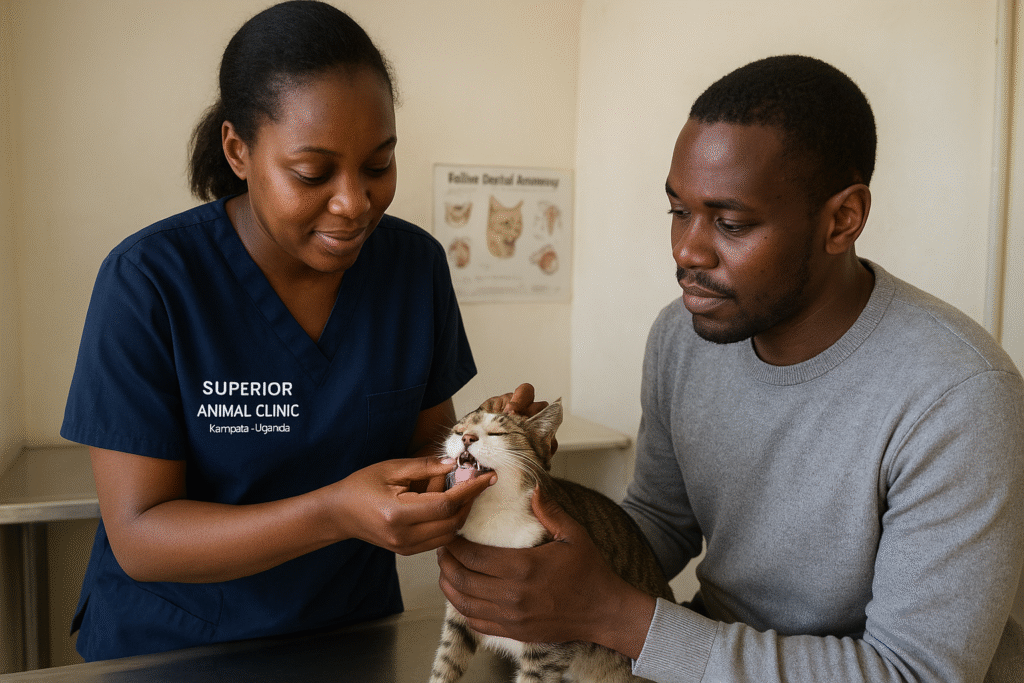
Drugs and Methods Used to Treat Cat Bad Breath in Kampala
At Superior Animal Clinic, we know that cat owners in Kampala often wonder: “Which medicines or treatments are used for bad breath in cats?” The truth is, the drugs and methods depend on the cause of the bad breath. Below are the main treatments we use in Kampala:
1. Professional Dental Cleaning (Scaling & Polishing)
- Method: We use ultrasonic dental scalers to remove tartar and plaque buildup under anesthesia. Afterward, teeth are polished to prevent bacteria from reattaching.
- Why it helps: This is the gold standard treatment for bad breath caused by dental disease.
2. Tooth Extraction (When Necessary)
- Method: Severely infected or broken teeth that cannot be saved are surgically removed.
- Drugs used: Local anesthetics (lidocaine) and general anesthesia (isoflurane) ensure the procedure is pain-free.
- Why it helps: Removes the source of infection and smell permanently.
3. Antibiotics (For Infections)
If the cause of bad breath is bacterial infection in the gums or mouth, we prescribe antibiotics such as:
- Amoxicillin-clavulanate (Clavamox) – First-line antibiotic for dental infections.
- Clindamycin (Antirobe) – Excellent for gum disease and bone infections.
- Metronidazole – Used in cases with anaerobic bacteria or severe oral infections.
👉 These drugs are widely available in Kampala and dispensed safely at Superior Animal Clinic.
4. Anti-inflammatory and Pain Management Drugs
After dental procedures, cats may experience pain or swelling. We commonly use:
- Meloxicam (Metacam) – A non-steroidal anti-inflammatory drug (NSAID) to reduce pain and inflammation.
- Buprenorphine – A safe opioid pain reliever for cats after extractions.
5. Antiseptic Mouth Rinses and Gels
To control bacteria inside the mouth, we recommend:
- Chlorhexidine oral rinses – Reduce bacteria and freshen breath.
- Dental gels (Vet Aquadent, Orozyme gel) – Applied directly to teeth and gums to prevent plaque buildup.
6. Treatment for Underlying Diseases
Sometimes, bad breath is caused by diseases outside the mouth:
- Kidney disease – Treated with fluids, special renal diets (Hill’s k/d, Royal Canin Renal), and medications to support kidney function.
- Diabetes – Managed with insulin injections and special diabetic diets.
- Liver disease – Treated with supportive medication like hepatoprotectants and dietary changes.
7. Deworming (When Parasites Are the Cause)
Cats with heavy worm infestations often have bad breath. We deworm using:
- Fenbendazole (Panacur)
- Pyrantel pamoate
- Milbemycin or Selamectin (also protect against fleas and mites)
8. Dietary Management and Special Foods
- Prescription Dental Diets – Such as Hill’s Prescription Diet t/d or Royal Canin Dental Care, which are designed to reduce plaque and tartar.
- High-quality commercial cat food – Avoiding bones, raw fish, or leftovers that contribute to infections.
✅ At Superior Animal Clinic, we don’t just treat the smell—we treat the root cause of the bad breath. That’s why we combine dental cleaning, medication, diet changes, and preventive care to ensure long-term results.
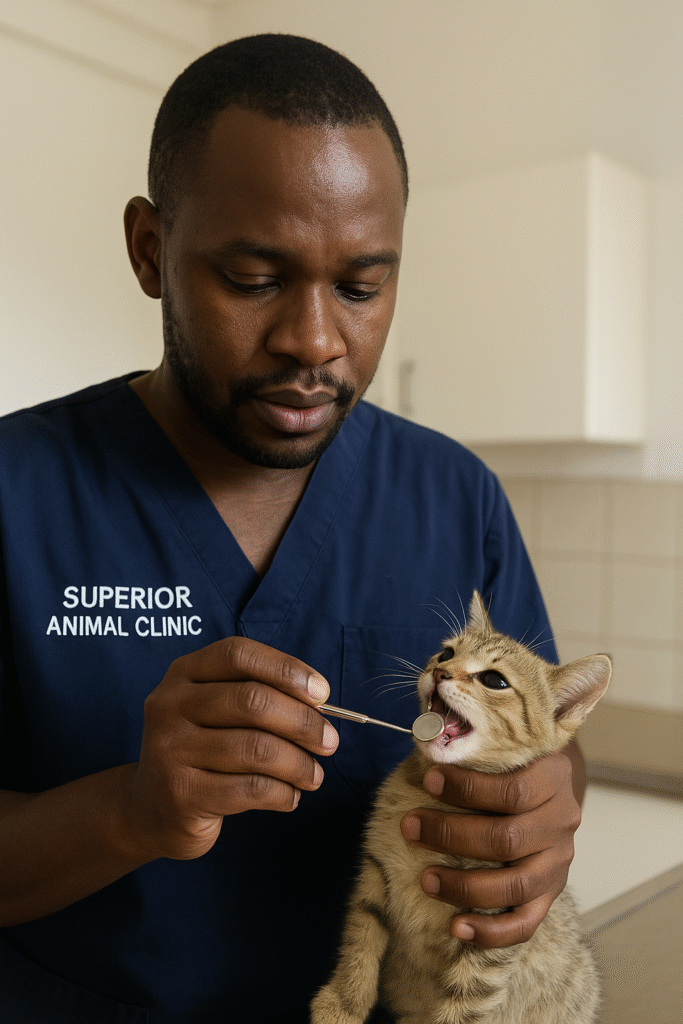
Best Foods for Cats with Bad Breath in Kampala, Uganda
Diet plays a critical role in managing and preventing bad breath in cats. At Superior Animal Clinic in Makindye, Kampala, we always emphasize the importance of feeding your cat the right food to support oral health, digestion, and overall wellness. Here’s a detailed guide for cat owners in Ntinda, Old Kampala, Kasubi, Nsambya, Katwe, Zana, Nakasero, Makindye, Buziga, Munyonyo, Nakawa, Rubaga, Muyenga, Naguru, Bugolobi, Kabowa, Kabojja, Lugogo, Lubowa, Seguku, Ndejje, Kololo, Mutundwe, Bukoto, Bulindo, and Kulambiro:
1. Prescription Dental Diets
- Hill’s Prescription Diet t/d – Clinically proven to reduce plaque and tartar buildup.
- Royal Canin Dental Care – Contains kibble designed to scrub teeth while chewing.
Why it helps: These diets mechanically clean teeth, reduce bacterial growth, and are ideal for cats already suffering from dental disease.
2. High-Quality Commercial Cat Food
- Look for brands available in Kampala like Whiskas, Me-O, or Fancy Feast, but choose dry kibble over wet food for daily meals.
- Dry food helps reduce plaque buildup, whereas wet food can stick to teeth and worsen bad breath.
Tip for Kampala cat owners: Avoid feeding only leftovers, fish bones, or table scraps—they are the leading cause of foul-smelling breath in many local cats.
3. Protein Sources That Promote Oral Health
- Boiled chicken or lean beef – Soft, easy to digest, and less likely to cause plaque.
- Cat-safe fish like cooked Nile perch or tilapia – Avoid raw fish and bones to prevent infection and injuries.
Important: Always remove bones and serve in small, manageable pieces.
4. Supplements and Chews
- Dental chews for cats (available in Kampala pet shops and clinics) help reduce tartar buildup.
- Coconut oil (small amounts) – Natural antibacterial properties; can improve oral hygiene.
- Parsley or cat-safe breath fresheners – Occasionally added to food for a natural freshening effect.
5. Hydration and Clean Water
- Provide fresh, clean water at all times.
- Hydration helps flush bacteria from the mouth and improves kidney and digestive health.
6. Foods and Habits to Avoid
- Raw fish, bones, or table scraps
- Spoiled meat or leftovers from the fridge
- Sugary or processed human food
Feeding the wrong diet is one of the most common causes of chronic bad breath in cats across Makindye, Bugolobi, Muyenga, Katwe, and Kasubi.
✅ Key Takeaway for Kampala Cat Owners:
Feeding the right foods is just as important as regular veterinary care. Combine dental diets, high-quality protein, supplements, and hydration with professional check-ups at Superior Animal Clinic to ensure your cat’s breath stays fresh and healthy.
Home Remedies for Bad Breath in Cats
While veterinary treatment is always best, some safe home remedies include:
- Brushing your cat’s teeth with a cat-safe toothbrush and paste
- Feeding dental chews for cats
- Giving coconut oil in small amounts (natural antibacterial)
- Adding parsley to food (natural breath freshener)
⚠️ Important: Home remedies should not replace veterinary care if your cat’s breath is persistently bad.
What Happens If You Don’t Treat Bad Breath in Cats?
Untreated bad breath can lead to:
- Severe gum disease and tooth loss
- Chronic pain and inability to eat
- Spread of infection to the heart, kidneys, and liver
- Early death in severe cases
Areas in Kampala Where Cat Bad Breath is Common
We frequently treat cats with bad breath from Makindye, Katwe, Nsambya, Buziga, Munyonyo, Muyenga, Bugolobi, and Kasubi. This is often linked to dietary habits, scavenging, and lack of regular vet checkups.
Prevention Tips
✔️ Regular dental cleaning at Superior Animal Clinic
✔️ Feeding quality cat food instead of scraps
✔️ Routine vet check-ups every 6 months
✔️ Brushing your cat’s teeth at home
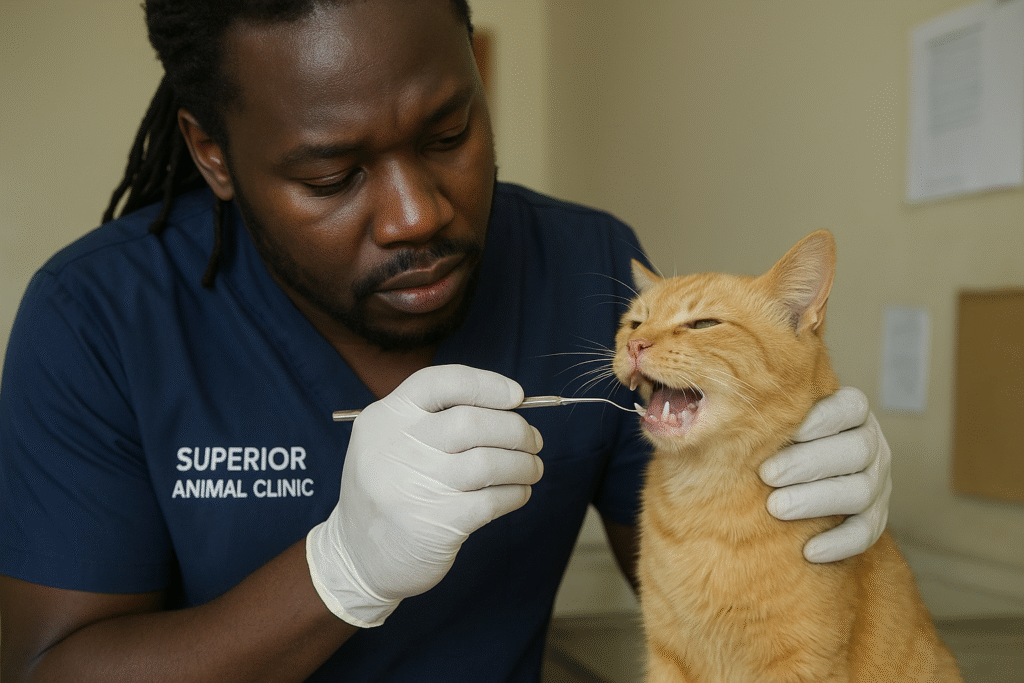
FAQs About Cat Bad Breath in Uganda
Q1: Why does my cat have bad breath in Kampala?
Cats in Kampala often develop bad breath due to dental disease, infections, kidney problems, diabetes, or poor diet. At Superior Animal Clinic, Makindye, we check your cat thoroughly to find the exact cause and provide effective treatment.
Q2: How can I tell if my cat’s bad breath is serious?
If your cat shows persistent foul-smelling breath, drooling, difficulty eating, weight loss, or swollen gums, it’s a sign of a serious problem. Cat owners in Ntinda, Old Kampala, Makindye, and Muyenga should book an appointment at Superior Animal Clinic immediately.
Q3: What is the best treatment for cat bad breath in Kampala?
The most effective treatment depends on the cause:
- Dental cleaning and polishing for tartar and plaque
- Tooth extraction for infected teeth
- Antibiotics and pain relief for oral infections
- Treatment for underlying conditions like kidney disease or diabetes
At Superior Animal Clinic, we provide all these services using safe and modern methods.
Q4: How much does it cost to treat cat bad breath in Kampala?
Costs vary depending on the severity of the problem, diagnostics, dental cleaning, or extractions. At Superior Animal Clinic, we offer affordable packages for cat owners across Makindye, Katwe, Bugolobi, Rubaga, Buziga, Munyonyo, and nearby areas. Ranging from UGX 50,000 to 250,000
Q5: Can bad breath in cats be treated at home in Kampala?
While home care like brushing, dental chews, and coconut oil can help prevent plaque, persistent bad breath usually requires professional treatment. Cat owners in Kasubi, Nakasero, Lugogo, and Kololo should bring their cats to Superior Animal Clinic for a proper check-up.
Q6: Which cats are more prone to bad breath in Kampala?
- Older cats – More likely to have dental and gum disease
- Breeds like Persians and Siamese – Genetic predisposition to oral problems
- Cats fed mostly fish or leftovers – Common in many Kampala households
- Outdoor or free-roaming cats – Prone to infections and injuries
Q7: How can I prevent bad breath in my cat in Kampala?
- Schedule regular dental check-ups at Superior Animal Clinic
- Feed high-quality cat food or dental diets
- Brush your cat’s teeth using cat-safe toothpaste
- Avoid table scraps, raw fish, and bones
- Keep your cat hydrated with fresh water daily
Q8: Are there home remedies for cat bad breath in Kampala?
Yes, some safe remedies include:
- Brushing teeth with cat toothpaste
- Dental chews for plaque control
- Small amounts of coconut oil for natural antibacterial effect
- Parsley or cat-safe breath fresheners
⚠️ These help prevent bad breath but cannot replace professional care, especially if your cat has underlying health issues.
Q9: Where can I find the best cat doctor for bad breath in Kampala?
Superior Animal Clinic, located in Makindye along Salaama Road, is the top choice for cat owners across Ntinda, Old Kampala, Kasubi, Nsambya, Katwe, Zana, Nakasero, Makindye, Buziga, Munyonyo, Nakawa, Rubaga, Muyenga, Naguru, Bugolobi, Kabowa, Kabojja, Lugogo, Lubowa, Seguku, Ndejje, Kololo, Mutundwe, Bukoto, Bulindo, and Kulambiro. Our veterinarians are experienced in diagnosing and treating all causes of bad breath in cats.
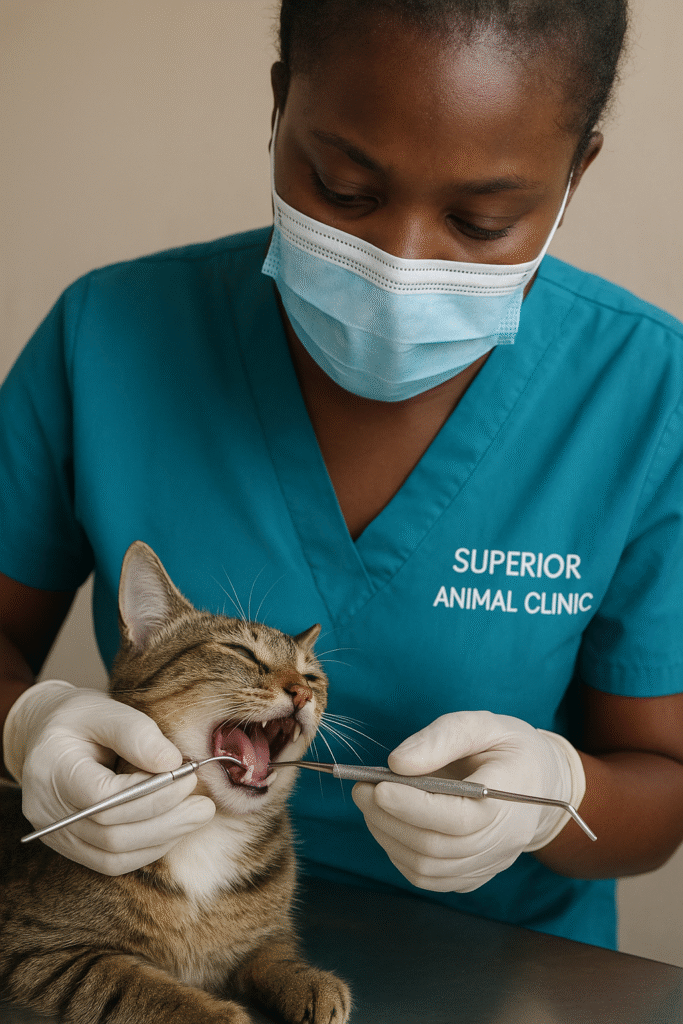
Q10: What happens if cat bad breath is not treated in Kampala?
Untreated bad breath can lead to:
- Severe dental disease and tooth loss
- Chronic pain and difficulty eating
- Spread of infection to kidneys, liver, or heart
- Serious systemic illness or early death
Professional treatment at Superior Animal Clinic prevents these complications.
Q11: Can bad breath in cats indicate a serious disease in Kampala?
Yes. Persistent bad breath can be a sign of dental disease, kidney failure, diabetes, liver problems, or oral tumors. Early detection at Superior Animal Clinic, Makindye can prevent serious complications.
Q12: How often should I take my cat for dental check-ups in Kampala?
We recommend every 6 months, especially for cats prone to dental issues. Regular check-ups help prevent tartar buildup, gum disease, and chronic bad breath.
Q13: Are indoor cats less likely to get bad breath in Kampala?
Indoor cats generally have fewer infections and injuries, so they are less prone to bad breath. However, poor diet or lack of dental care can still cause halitosis, which is why Superior Animal Clinic advises preventive care for all cats.
Q14: Can certain foods make my cat’s breath worse in Kampala?
Yes. Raw fish, bones, table scraps, and spoiled food can cause bacterial growth and infections. Feeding your cat high-quality commercial cat food or dental diets is the best way to prevent bad breath.
Q15: Can I brush my cat’s teeth at home in Kampala?
Yes. Brushing with cat-safe toothpaste and a soft toothbrush helps prevent tartar and plaque. Start slowly, make it a positive experience, and combine it with regular vet dental check-ups at Superior Animal Clinic.
Q16: What are the early signs of bad breath in cats that owners in Kampala should watch for?
- Foul odor from the mouth
- Drooling or pawing at the mouth
- Difficulty chewing or eating
- Loss of appetite
- Swollen or bleeding gums
Early detection allows for prompt treatment before serious dental or systemic issues develop.
Q17: Is bad breath more common in kittens or adult cats in Kampala?
Bad breath is more common in adult and senior cats, especially those over 3 years old, due to gum disease and tartar buildup. However, kittens with congenital issues or poor diet may also develop halitosis.
Q18: Are there safe home remedies for bad breath in cats in Kampala?
Yes, but they cannot replace veterinary care. Safe remedies include:
- Cat-friendly dental chews
- Coconut oil in small amounts
- Adding parsley to meals for a freshening effect
- Brushing teeth with cat-safe toothpaste
Q19: Can bad breath in cats be prevented in Kampala?
Absolutely. Preventive measures include:
- Regular vet dental check-ups at Superior Animal Clinic, Makindye
- Feeding dental diets and high-quality food
- Home tooth brushing and dental chews
- Avoiding bones, raw fish, and leftovers
Q20: Which areas in Kampala does Superior Animal Clinic serve for cat dental care?
We serve all major neighborhoods, including:
Ntinda, Old Kampala, Kasubi, Nsambya, Katwe, Zana, Nakasero, Makindye, Buziga, Munyonyo, Nakawa, Rubaga, Muyenga, Naguru, Bugolobi, Kabowa, Kabojja, Lugogo, Lubowa, Seguku, Ndejje, Kololo, Mutundwe, Bukoto, Bulindo, and Kulambiro.
Why Choose Superior Animal Clinic for Cat Bad Breath Treatment in Kampala?
- Experienced veterinarians who understand cat dental health in Uganda
- Affordable treatment packages
- Modern equipment for dental cleaning and treatment
- Accessible location in Makindye along Salaama Road
- Trusted by cat owners across Kampala
👉 If your cat has bad breath, don’t wait until it’s too late. Book an appointment today with Superior Animal Clinic—the best veterinary clinic for cats in Kampala.
📍 Location: Makindye, Salaama Road, Kampala
📞 Call/WhatsApp: +256771909946
Cat bad breath in Kampala? Visit Superior Animal Clinic Makindye for professional treatment, dental cleaning, and expert care for your feline friend

Your article helped me a lot, is there any more related content? Thanks!